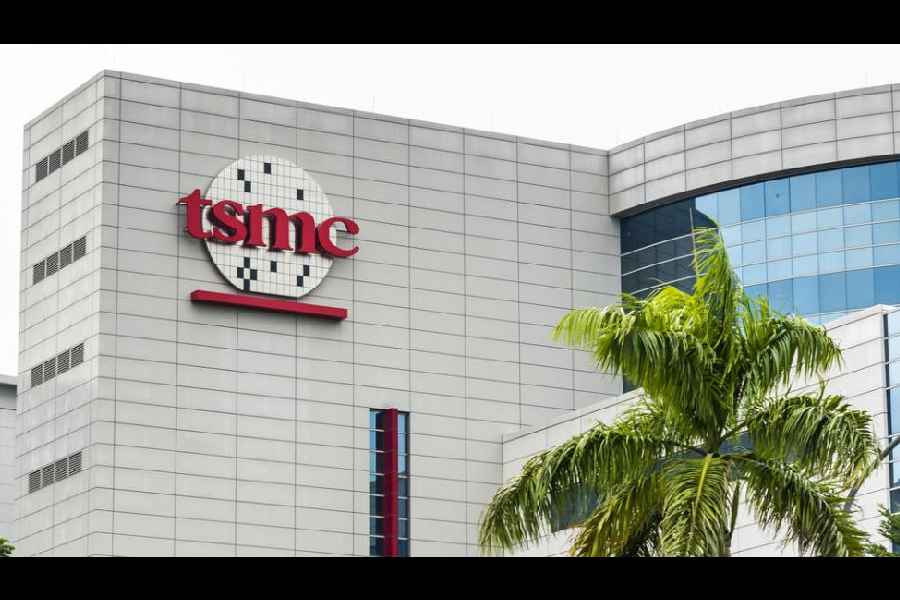Taiwan Semiconductor Manufacturing Co. (TSMC), makers of the world’s most advanced microchips, conducts business on the island of Taiwan, one of the most geopolitically volatile places.
That makes people in Washington very nervous. TSMC dominates the semiconductor industry; it’s a company the US can’t do without, 130km off the China coast.
The US government has appropriated tens of billions of dollars to strengthen their own semiconductor sector and help fund TSMC’s nascent operations in the US.
But TSMC has invested billions of its own over nearly four decades, growing deep roots in Taiwan. There, it employs a small army of engineers, research and development scientists, technicians and production workers in the exquisitely complex task of producing chips, etching electronic pathways smaller than a cell on plates of silicon.
It would be exceedingly difficult to replicate what TSMC has built in Taiwan, said Mark Liu, chairman of TSMC. Developing and producing the company’s most cutting-edge chips at a rapid pace requires a huge effort, he said. “We cannot put it anyplace else.”
TSMC has embarked on a global expansion, with two factories under construction in the US and one in Japan. It’s part of the strategy to address calls by US officials to reduce America’s reliance on chips made in Taiwan.
That makes the 68-year-old Liu, who holds a doctoral degree in electronic engineering and computer science, as much a diplomat as a scientist and an executive. He runs the $500 billion company with its CEO and vice chair, C.C. Wei.
“We have a pretty good relationship across Congress, the commerce department, the White House,” he said.
It’s a bit of an understatement. Initial efforts to court TSMC and bring its production facilities to the US led to the creation of the CHIPS and Science Act, a programme to expand the US semiconductor industry. So complete is TSMC’s lead in the industry that there is no obvious second option for all it does. Any clash over Taiwan would stop the flow of the TSMC microchips, putting a deep freeze on the technology industry and, in turn, the global economy.
Political leaders in the US and its allies in trade battles with China have pushed TSMC to build production facilities outside Taiwan. And China has tried hard to compete with TSMC, using everything from hacks and intellectual property theft to hundreds of billions of dollars in investment.
As the US has sought to hinder China’s advances in semiconductor technology, TSMC has been caught in the middle. In 2020, TSMC cut off orders to the Chinese tech powerhouse Huawei, which was TSMC’s second-largest customer at the time. Liu said TSMC, because it is reliant on American technology, had no choice.
“It’s understandable, but
support or not, we have no say,” he said. Liu rejected the idea of the “silicon shield”: that Taiwan’s chipmaking prowess deters military action by China and brings support from the US. Both need Taiwan’s chips.
“China will not invade Taiwan because of semiconductors. China will not not invade Taiwan because of semiconductors,” he said. “It is really up to the US and China: how do they maintain the status quo, which both sides want?”
The Arizona plants have been slow going, and the company has deployed hundreds of Taiwanese technicians to expedite the process. Last month it pushed back the expected start date to 2025. Internal tensions over cultural differences have surfaced between TSMC and American workers.
And doubts loom over whether US companies will be willing to pay the likely premium required for chips made in Arizona, where TSMC’s construction costs alone could be at least four times higher than they are in Taiwan. Liu said he had told the US government that it needed to offer American companies incentives, beyond the $52 billion in subsidies in the CHIPS Act, to buy US-made chips.
“Otherwise, it will be limited,” he said. “It will come to limits pretty quickly. So that is on the table. But I don’t think we have a solution yet.”
NYTNS











